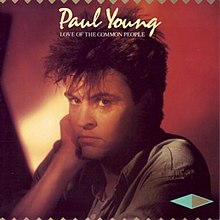
"Can't Help Falling in Love" is a song recorded by American singer and actor Elvis Presley for his fourth soundtrack album, Blue Hawaii (1961). It was written by Hugo Peretti, Luigi Creatore, and George David Weiss and published by Gladys Music, Inc. The melody is based on "Plaisir d'amour", a popular French love song composed in 1784 by Jean-Paul-Égide Martini. The song was initially written from the perspective of a woman as "Can't Help Falling in Love with Him", which explains the first and third line ending on "in" and "sin" rather than words rhyming with "you".
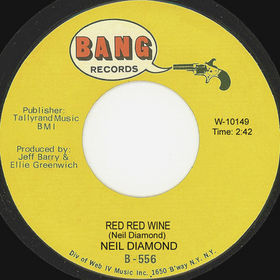
"Red Red Wine" is a song originally written, performed and recorded by American singer Neil Diamond in 1967 that appears on his second studio album, Just for You. The lyrics are written from the perspective of a person who finds that drinking red wine is the only way to forget his woes.

No Parlez is the debut solo studio album by English singer Paul Young. Released in 1983, it reached number one on the UK Albums Chart and remained in the UK Top 100 for 119 weeks. The album has been certified quadruple platinum by the BPI for UK sales in excess of 1.2 million copies.

"Silly Love Songs" is a song by the British–American rock band Wings that was written by Paul and Linda McCartney. The song first appeared in March 1976 on the album Wings at the Speed of Sound, then it was released as a single backed with "Cook of the House" on 1 April in the US, and 30 April in the UK. The song, which features disco overtones, was written in response to music critics accusing McCartney of predominantly writing "silly love songs" and "sentimental slush"; however, McCartney has since clarified that the song was actually directed to John Lennon who accused him of writing such songs.
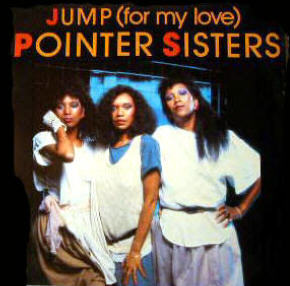
"Jump (For My Love)" is an electro-pop song by American girl group the Pointer Sisters, released on April 11, 1984, as the third single from their tenth studio album, Break Out (1983). The song hit the top ten on the US Billboard Hot 100, R&B, and Dance charts, and it was the best-selling American dance single of 1984, sold as a trio of songs including "I Need You" and "Automatic". The song features June Pointer on lead vocals and scored global chart success.
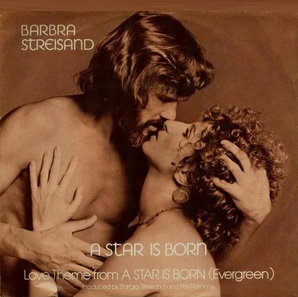
"Evergreen" is the theme song from the 1976 film A Star Is Born. It was composed and performed by American singer, songwriter, actress and director Barbra Streisand with lyrics by Paul Williams, and arranged by Ian Freebairn-Smith. The song was released on the soundtrack album to A Star Is Born.
"Dedicated To The One I Love" is a song written by Lowman Pauling and Ralph Bass that was a hit for the "5" Royales, the Shirelles, the Mamas & the Papas and Bitty McLean. Pauling was the guitarist of the "5" Royales, the group that recorded the original version of the song, produced by Bass, in 1957. Their version was re-released in 1961 and charted at number 81 on the Billboard Hot 100.

"I Can See Clearly Now" is a song written and recorded by American singer-songwriter Johnny Nash. It was the lead single from his twelfth album, I Can See Clearly Now (1972), and achieved success in the United States and the United Kingdom when it was released in 1972, reaching number one on the US Billboard Hot 100 and Cash Box charts. It also reached number one in Canada and South Africa. The song has been covered by many artists throughout the years, including a hit version by Lee Towers that reached no. 19 in the Dutch Top 40 in 1982, and another recorded by Jimmy Cliff for the motion picture soundtrack of Cool Runnings that peaked at no. 18 on the US Billboard Hot 100 in 1993.

"Games People Play" is a song written, composed, and performed by American singer-songwriter Joe South, released in August 1968. It entered the Billboard Hot 100 in January 1969 and won the 1970 Grammy Awards for both Best Contemporary Song and the Song of the Year.
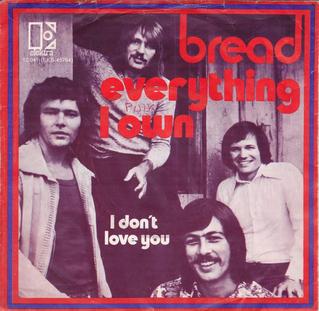
"Everything I Own" is a song written by American singer-songwriter David Gates. It was originally recorded by Gates's soft rock band Bread for their 1972 album Baby I'm-a Want You. The original reached No. 5 on the American Billboard Hot 100. Billboard ranked it as the No. 52 song for 1972. "Everything I Own" also reached No. 5 in Canada and No. 12 in Australia.

"Can't Get Used to Losing You" is a song written by Jerome "Doc" Pomus and Mort Shuman, first made popular by Andy Williams in a 1963 record release, which was a number-two hit in both the US and the UK. Twenty years later, British band the Beat took a reggae re-arrangement to number three in the UK.
"One Love" is a ska song written by Bob Marley and recorded by his group the Wailers from their 1965 debut studio album The Wailing Wailers. It was rerecorded as part of the 1970 medley "All in One", which contained reggae reworkings of their early ska songs. This was released as a single and is also included on the compilation African Herbsman under the name "All in One".

"Electric Avenue" is a song by Guyanese-British musician Eddy Grant. Written and produced by Grant, it was released on his 1982 studio album Killer on the Rampage. In the United States, with the help of the MTV music video he made, it was one of the biggest hits of 1983. The song refers to Electric Avenue in London during the 1981 Brixton riot.
"Sweets for My Sweet" is a song written by the songwriting team of Doc Pomus and Mort Shuman, originally recorded by American doo-wop and R&B/soul vocal group the Drifters.

"Baby, I Love Your Way" is a song written and performed by English singer Peter Frampton, released as a single in September 1975. It first featured on Frampton's 1975 album, Frampton, where it segues from the previous track "Nassau".

"Love Is in the Air" is a 1977 disco song by Australian singer John Paul Young. It was written by George Young and Harry Vanda, and released as the lead single from Young's fourth studio album, Love Is in the Air (1978). The song became a worldwide hit in 1978, peaking at No. 3 on the Australian charts and No. 5 on the UK Singles Chart. In the United States, it peaked at No. 7 on the pop chart and spent two weeks at No. 1 on the Adult Contemporary chart, his only U.S. top 40 hit. The song plays at 122 beats per minute, a typical 1970s disco rhythm. At the Australian 1978 King of Pop Awards, the song won Most Popular Australian Single. In 1992, a remix of the song was released and featured on the soundtrack to the Golden Globe-nominated film Strictly Ballroom. A new music video was also produced.
"Homely Girl" is a song by American vocal group the Chi-Lites. Release in 1973, it reached number five on the UK Singles Chart, number three on the US Hot Soul Singles chart, and number 54 on the US Billboard Hot 100. A cover by UB40 also became a hit between 1989 and 1991 in several countries.

"Stuck on You" is a song written and originally recorded by American singer and songwriter Lionel Richie. It was the fourth single released from his second studio album, Can't Slow Down, released in June 1984, by Motown, and achieved chart success, particularly in the US and the UK, where it peaked at number three and number 12, respectively. "Stuck on You" reached number one on the Adult Contemporary chart, Richie's seventh chart topper.

"I'm Gonna Tear Your Playhouse Down" is a song written by Memphis-based songwriter Earl Randle, and first recorded in 1972 by soul singer Ann Peebles. The song was also a hit in 1984 for English singer Paul Young.
"Softly Whispering I Love You" is a song written by Roger Greenaway and Roger Cook originally recorded by the duo under the name of David and Jonathan. This version peaked at No. 23 in Australia on Go-Set's National Top 40 Singles Chart.

